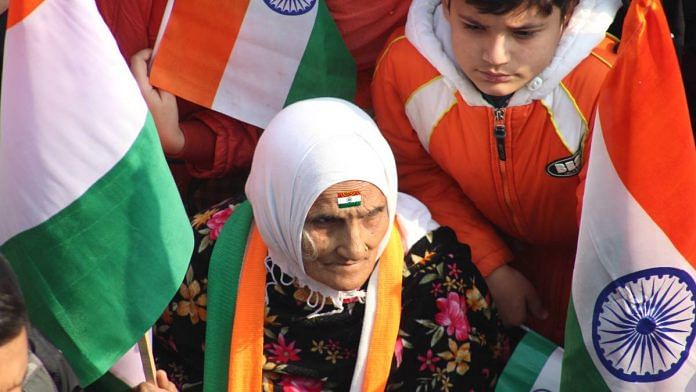A dear friend said, “The problem today is that Indian Muslims don’t have a leader. And Muslim politicians have mostly ditched their own community for years.” This friend doesn’t believe that anybody could represent the real issues of Muslims and since there aren’t many Muslim representatives, I should join politics. “You guys need a Muslim leader, desperately.”
I kept looking at him for a long time, my mind echoing with just one word—Muslim, Muslim, Muslim. Since childhood, I have only heard ‘Indian’. He continued, “Good Muslims need to join politics. Only then fair representation is possible.” This dialogue, tinged with a hint of urgency, implied that, as a Muslim, I should consider a foray into politics to fill a perceived void.
I couldn’t stop myself from asking, “Are you admitting that, for years, ‘you guys’ have had Hindu leaders? Politicians who just represented Hindus? Isn’t it strange and totally unconstitutional for people to elect or get elected based on religion? And have you, too, been voting as a Hindu?” His silence validated my point.
And just like that, the Constitution of India was defeated again. We often forget why we became a democracy in the first place. No other model of governance could sustain the beautifully diverse country that India is. In the colourful mosaic, where emotions and identity interweave, there must be a promise of equality. The Constitution hinges on the right to equality.
The suggestion from my friend, though well-intentioned, unwittingly unravelled a broader issue – the assumption that communities should be exclusively represented by leaders of their religious background. This sentiment contradicts the fundamental principles embedded in the Indian Constitution, which mandates the representation of all citizens, irrespective of their religious beliefs. This sparked a journey into rediscovering the essence of Indian secularism.
Nestled in a New Delhi colony, surrounded by a Sikh neighbourhood, a Hindu community, and a church, my upbringing mirrored India’s kaleidoscopic cultural landscape. The diverse tapestry of my surroundings never compelled me to view friends and neighbours through the lens of religion. From attending a convent preschool to spending my formative years in a Sikh institution, my education was a celebration of varied teachings. I merrily sang Shabads and celebrated Diwali most joyously. I still do. My friends are from different backgrounds, and religious differences were an inconspicuous thread in the rich fabric of our camaraderie. This upbringing instilled in me the belief that religion is a deeply personal matter, and one’s identity should transcend religious labels.
Also read: Modi-Shah completing their unfinished 2020 agenda by backing Nitish Kumar
What leaders must focus on
Contemplating the idea of having a Muslim leader exclusively to represent Muslims, I found myself questioning the very essence of our democratic principles. The Constitution, a visionary document, serves as the moral compass that unites our nation. Upholding values of equality, justice, and liberty, it transcends religious, caste, and creed-based distinctions. In the eloquent words of MK Gandhi, “I do not want my house to be walled in on all sides and my windows to be stuffed. I want the cultures of all lands to be blown about my house as freely as possible.”
The call for a leader representing all Indians resonates with the inclusive spirit of the Constitution. Former Prime Minister Jawaharlal Nehru’s vision of a nation that celebrates diversity becomes especially relevant: “We are citizens of a great country, on the verge of bold advance, and we have to live up to that high standard. All of us, to whatever religion we may belong, are equally the children of one mother.” Leaders should embody this vision, work towards building bridges, foster understanding, and unify a diverse citizenry.
The focus should be on the commonalities that bind us together, not the differences that threaten to divide.
The notion of leaders representing specific religious communities perpetuates the unfortunate trend of communal politics, which has the potential to undermine the unity that defines India. We, as a nation, are struggling with precisely the same situation.
As Rabindranath Tagore eloquently phrased it, “The one who plants trees, knowing that he will never sit in their shade, has at least started to understand the meaning of life.” True leaders plant seeds of unity, understanding that the shade of progress and prosperity will benefit every citizen, regardless of which God they worship.
We don’t need a ‘Sikh’ leader for Sikhs, a ‘Christian’ for Christians, a ‘Jain’ for Jains, a ‘Buddhist’ for Buddhists, a Hindu for Hindus, or a ‘Muslim’ for Muslims.
As a Muslim in India, my hope lies in leadership that rises above religious labels and embraces the collective identity of our nation. The Constitution’s sacred oath binds our leaders to represent all communities, fostering unity and inclusive governance. Leaders must rise above divisive narratives. As citizens, we should strive for a society where our shared identity as Indians takes precedence over individual religious affiliations. It is this unity that will propel India toward a brighter and more harmonious future, grounded in the principles of justice, equality, and fraternity.
Sayema Rahman is a radio broadcaster and public figure. She tweets @_sayema. Views are personal.
(Edited by Ratan Priya)
This article is the third part of a series called ‘Where is the Muslim leadership question’.



